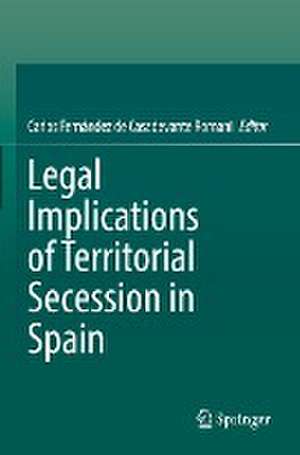Legal Implications of Territorial Secession in Spain
Editat de Carlos Fernández de Casadevante Romanien Limba Engleză Paperback – 2 oct 2023
The book deals with the secession/separation of territorial entities and the legal consequences that derive from it both for the parent state and for the seceded/separated entity or the entity that intends to secede/separate. This subject is approached from the triple perspective of international law, comparative law, and Spanish law.
International law, because it is this legal system which contains the general legal framework within which this issue must be dealt with. Thus, for example, the legal basis of the right to self-determination, the constituent elements of the state, the recognition of states and governments, succession in the matter of treaties, succession in membership of International Organisations, etc.
Moreover, international law is also the reference invoked by secessionist/independentist political projects within states in an attempt to provide a legal basis for the legality of their claim.
Comparative law, in order to find out not only how most state constitutions deal with secession or independence of their territories, but also the jurisprudence handed down by national courts on the matter (USA, Canada, Italy, France, Spain, among others).
And finally, Spanish Law, because the perspective chosen to address the object of study is from the perspective of Spain.
| Toate formatele și edițiile | Preț | Express |
|---|---|---|
| Paperback (1) | 951.77 lei 6-8 săpt. | |
| Springer International Publishing – 2 oct 2023 | 951.77 lei 6-8 săpt. | |
| Hardback (1) | 958.07 lei 6-8 săpt. | |
| Springer International Publishing – oct 2022 | 958.07 lei 6-8 săpt. |
Preț: 951.77 lei
Preț vechi: 1160.70 lei
-18% Nou
Puncte Express: 1428
Preț estimativ în valută:
182.13€ • 190.39$ • 153.91£
182.13€ • 190.39$ • 153.91£
Carte tipărită la comandă
Livrare economică 06-20 martie
Preluare comenzi: 021 569.72.76
Specificații
ISBN-13: 9783031046117
ISBN-10: 3031046110
Pagini: 437
Ilustrații: XII, 437 p.
Dimensiuni: 155 x 235 mm
Greutate: 0.63 kg
Ediția:1st ed. 2022
Editura: Springer International Publishing
Colecția Springer
Locul publicării:Cham, Switzerland
ISBN-10: 3031046110
Pagini: 437
Ilustrații: XII, 437 p.
Dimensiuni: 155 x 235 mm
Greutate: 0.63 kg
Ediția:1st ed. 2022
Editura: Springer International Publishing
Colecția Springer
Locul publicării:Cham, Switzerland
Cuprins
The absence of any basis for secession in the right of self-determination of peoples and in the serious violations of human rights.- Secession through constitutional reform? A comparative study.- The right to self-determination: an interpretation from Spain.- Debate on International Law as a foundation for independence: Catalonia.- The formation of the State in the international legal order. Proceedings for secessionist entities.- The role of recognition in access to statehood and the obligation not to recognize a secessionist entity as a state.- Secession and succession in respect of boundary treaties and boundary regimes with regard to Spain and the neighbouring States.- Borderlands of Spain in Andorra, Olivença, Ceuta, Melilla and Gibraltar.- There is no right to succession in the membership of International Organizations as a result of secession.- Succession of States in Respect of Treaties on Human Rights.- Secession, international responsibility and human rights.- The notion of exception in the Spanish Constitution of 1978: Theory and practice.
Notă biografică
Carlos Fernández de Casadevante Romani is Professor of Public International Law and International Relations. Formerly, he worked at the University of the Basque Country, Spain (1992–2000), and currently, he works at the University Rey Juan Carlos, Madrid (since 2000), where he teaches public international law and European Union law. In the frame of this last activity, he is holder of Chair Jean Monnet and has directed Jean Monnet Modules on international and European protection of environment as well as on terrorism, democracy, and human rights (1990–2005). Since 1990, he has been an invited professor at the University of Pau et des Pays de l’Adour (France), at the Bayonne campus (Master Études Européennes et Internationales).
He is author of an extensive scientific work in Spanish, French, and English on international protection of human rights, rule of law, territory, sovereignty, frontiers, neighborhood relations, and cross-border cooperation, and some of its results have been published by Springer (Sovereignty and Interpretation of International Norms, 2007, and International Law of Victims, 2012).
Textul de pe ultima copertă
The book deals with the secession/separation of territorial entities and the legal consequences that derive from it both for the parent state and for the seceded/separated entity or the entity that intends to secede/separate. This subject is approached from the triple perspective of international law, comparative law, and Spanish law.
International law, because it is this legal system which contains the general legal framework within which this issue must be dealt with. Thus, for example, the legal basis of the right to self-determination, the constituent elements of the state, the recognition of states and governments, succession in the matter of treaties, succession in membership of International Organisations, etc.
Moreover, international law is also the reference invoked by secessionist/independentist political projects within states in an attempt to provide a legal basis for the legality of their claim.
Comparative law, in order to find out not only how most state constitutions deal with secession or independence of their territories, but also the jurisprudence handed down by national courts on the matter (USA, Canada, Italy, France, Spain, among others).
And finally, Spanish Law, because the perspective chosen to address the object of study is from the perspective of Spain.
Caracteristici
Analyses the practice of States and International Organisations
Interdisciplinary and global approach
Addresses the secession/independence of territorial entities
Interdisciplinary and global approach
Addresses the secession/independence of territorial entities
